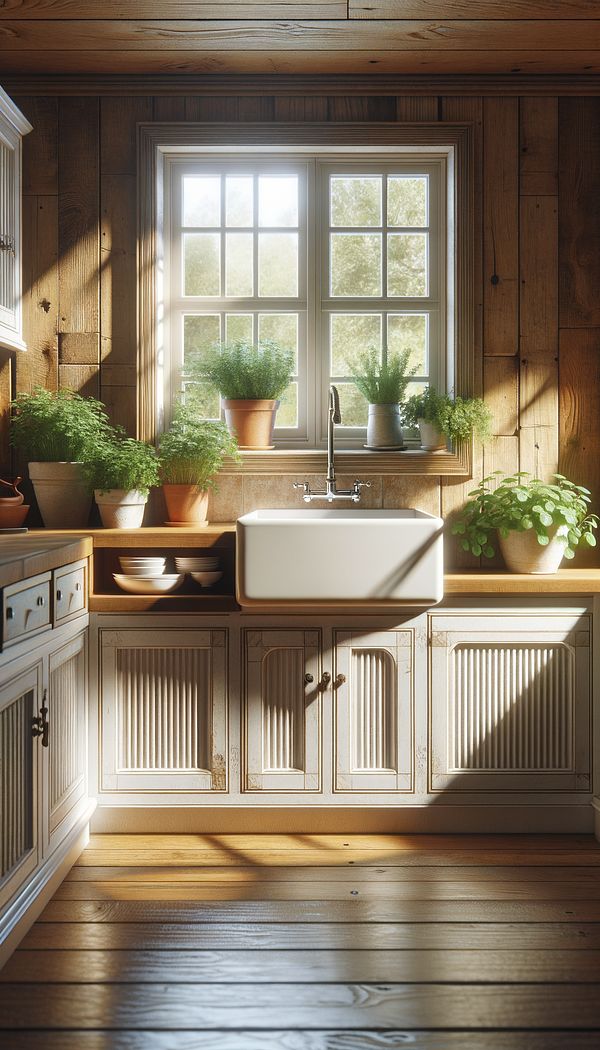What is an Apron-Front Sink?
An apron-front sink is a type of sink that features a distinctive, exposed front panel.
Description
An apron-front sink, often referred to as a farmhouse sink, is a sink design that has gained popularity in both traditional and contemporary kitchens due to its deep basin and distinctive, exposed front panel. This style of sink integrates seamlessly into the countertop and cabinetry, with the front panel of the sink visible and extending slightly beyond the cabinetry line. The design is not only aesthetically pleasing but also practical, offering ample space for washing large pots and pans.
Apron-front sinks are available in a variety of materials, including stainless steel, porcelain, and even copper, allowing them to complement a wide range of interior design styles. Their size and design make them a focal point in the kitchen, contributing significantly to the room's overall look and feel. Due to their size, however, they often require custom cabinetry to ensure a proper fit.
This type of sink is especially popular in kitchens aiming for a country, farmhouse, or rustic aesthetic, but its versatility means it can find a place in almost any design scheme. It's a symbol of functionality merging with style, blending seamlessly into both modern and vintage-inspired spaces.
Usage
Apron-front sinks are commonly found in residential kitchens, particularly in homes looking to evoke a warm, inviting atmosphere with a hint of rustic charm. They are also increasingly seen in more modern and minimalistic kitchen designs, where the clean lines and deep basin of the sink add both function and an understated elegance.
FAQs
-
Can an apron-front sink be installed in an existing kitchen?
Yes, an apron-front sink can be installed in an existing kitchen, but it may require custom cabinetry or modifications to existing cabinetry due to its unique front-exposed design and depth.
-
Are there different sizes of apron-front sinks?
Yes, apron-front sinks come in various sizes to fit different kitchen layouts and needs. It's essential to measure your space carefully and consider the sink's depth when planning for installation.
-
How do I clean and maintain an apron-front sink?
Cleaning and maintenance depend on the material of the sink. For example, stainless steel sinks can be cleaned with mild soap and water, while porcelain sinks might need specific cleaners to avoid staining. Always follow the manufacturer's recommendations for care.
-
Why are apron-front sinks more expensive than other types?
Apron-front sinks often require custom cabinetry for installation and are made from high-quality materials, contributing to their higher cost compared to standard sinks.
-
Can an apron-front sink fit in a small kitchen?
While apron-front sinks are generally larger, there are compact models designed for smaller kitchens. However, considering their size and the space required for installation is crucial.
Practical Application
When choosing an apron-front sink for your kitchen, consider the material and size that best fit your style and functional needs. Plan for custom cabinetry, if necessary, and involve a professional installer to ensure a seamless fit and finish. This sink type offers a mix of aesthetic appeal and practicality, making it a worthy investment for those looking to create a focal point in their kitchen.
-
CabinetsCabinets are storage units that are typically enclosed by doors, drawers, or shelves.
-
NSF - National Sanitation FoundationNSF International is a global independent organization that develops standards, and tests and certifies products in the interest of public health and safety.
-
Kitchen CartA kitchen cart is a mobile workstation and storage unit designed for use in the kitchen.
-
ApronAn apron is a decorative or structural panel fixed beneath a surface such as a tabletop, window ledge, or countertop.
-
GraniteGranite is a hard, granular, igneous rock primarily composed of quartz, mica, and feldspar.
